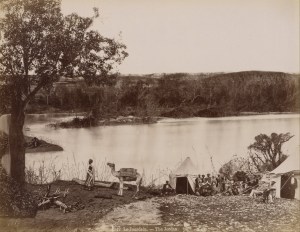The Journey to Bethlehem
Mary packed as though she and Joseph were changing residences rather than making a round trip—that’s what astute travelers of her day did. Perhaps she had an idea or premonition that it would be a long time before they would return to Nazareth and home. There would be caravanserais[1] along the way, usually situated where roads crossed, for food and water, bathing, supplies, fodder for the animals, and places to sleep; but the wise and experienced often brought along their own tents and blankets as well as clothing and containers of dried raisins and other foodstuffs, water, oil, and flour, prepared for any eventuality.
Joseph was well aware of the difficulties of such a journey, not just for Mary in her condition, but for their safety as well. The eighty-mile trip could take as many as five days or possibly more, depending on the route and traveling conditions. The shortest and most direct way, through Samaria, was not an option for most Jewish travelers in light of long-standing animosities. They would rather face the threat of robbers and bandits[2] who often menaced the next best highway.
 Caravans frequently traversed Roman roads, including the one he likely chose[3]—the road that went east from Nazareth, crossed the Jordan, and ran south through Perea toward Jerusalem. Ideally they could join such a convoy and lessen the danger along the way. Such a group contained a lively cross-section of humanity. Along with the average traveler and perhaps courses of priests on their way to fulfill their duties in the Temple, opportunistic hawkers often joined these odysseys, producing the latest articles of commerce or luxury, and passing on the most titillating news of the day. Nighttime chatter around campfires must have been a welcome relief from the monotony of seemingly endless miles of travel.
Caravans frequently traversed Roman roads, including the one he likely chose[3]—the road that went east from Nazareth, crossed the Jordan, and ran south through Perea toward Jerusalem. Ideally they could join such a convoy and lessen the danger along the way. Such a group contained a lively cross-section of humanity. Along with the average traveler and perhaps courses of priests on their way to fulfill their duties in the Temple, opportunistic hawkers often joined these odysseys, producing the latest articles of commerce or luxury, and passing on the most titillating news of the day. Nighttime chatter around campfires must have been a welcome relief from the monotony of seemingly endless miles of travel.
Taxed to the limit
Did Joseph and Mary hear grumbling about the latest demands and scandals of Rome? Most likely, and with good reason. The general population was already taxed to the limit[4], and now this. Word had it that Caesar was displeased at the declining birthrate[5] in his empire, and this census would confirm his annoyance. It would not only give him his numbers, but replenish his coffers as well. Resentment seethed under the surface at the injustice of it all, a malignant stow-away on this mandatory trek to be counted. What they needed was a deliverer, and soon!
(To be continued.)
[1] Follow the link below for a picture of an Ottoman caravanserais built in the 1700s. Those available to Mary and Joseph were probably much smaller, but were also walled enclosures with guest rooms on upper levels, and the terrace level below, used for bedding down the animals. At night the gate was secured to protect travelers from robbers and wild beasts.
http://upload.wikimedia.org/wikipedia/commons/d/d1/Akko_BW_13.JPG
[2] Palestine was home to highwaymen who robbed only for personal gain, and guerrilla warriors who directed their aggression against Roman Authorities and/or the Jewish authorities and persons who collaborated with them. Even the Apostle Paul was alert to such dangers in his travels (2 Corinthians 11:26). For more information on the social world of bandits, see the following link: http://bibleresources.americanbible.org/node/1511 .
[3] Alfred Edersheim, in his Sketches of Jewish Social Life in the Days of Christ (1980), mentions six different highways or main arteries of commerce in Palestine. See Chapter IV, pp. 42-45. The one I chose for the journey of Joseph and Mary seems to me to be the most likely.
[4] Richard A. Horsely with John S. Hanson, Bandits, Prophets, and Messiahs (1985). During the time of Julius Caesar, “the Jewish agricultural producers were now subject to a double taxation, probably amounting to well over 40 percent of their production. There were other Roman taxes as well, which further added to the burden of the people, but the tribute was the major drain” p. 56. “If a peasant family, after rendering up 40 percent or more of its harvest, then had too little left to survive until the next harvest, it would have to borrow grain for food, or for seed for the next sowing….Continued borrowing would increase a family’s debt significantly, with great risk of complete loss of land …[and] sink into the ranks of…the landless day laborers, or…become a sharecropping tenant” (pp.58-59).
[5] Dio Cassius, Roman History, 1vi, 1-10. Dio Cassius tells of one occasion when Augustus was so vexed by the declining marriage and birth rates that he strode into the Forum, separated the married men and bachelors he found there into two different groups and then let the bachelors have it: “What shall I call you? Men? But you aren’t fulfilling the duties of men. Citizens? But for all your efforts, the city is perishing. Romans? But you are in the process of blotting out this name altogether! . . . What humanity would be left if all the rest of mankind should do what you are doing? . . . You are committing murder in not fathering in the first place those who ought to be your descendants!” Quoted in Paul L. Maier’s In the Fullness of Time (1991), p.6.



